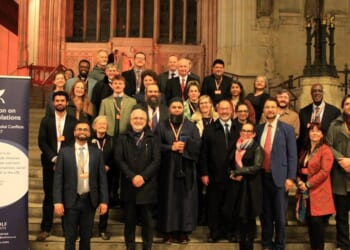(LifeSiteNews) — Emma Watson made waves recently when commentators claimed she said it is “violence” to marry or to be “encouraged” to marry.
If that is in fact what she said, it would be wildly absurd. She actually said something very different, that, while hyperbolic, expresses the message felt by many singles, including especially Christian singles: That if you haven’t married, you haven’t succeeded in life, and your worth is doubtful.
Yes, it’s true that marriage and children are meant to be the sanctifying and fruitful path of life for the majority of people. And it’s true that many secular people have ignored this design of God, with couples aimlessly living or sleeping together for years on end without marriage or children, effectively using each other and abdicating their calling.
But that’s not the scenario for a good chunk of unmarried people today. A great deal of these people are single, trying to deliberately date/court for marriage, and haven’t found the person they want to marry. This seems to be the case for Watson, who described marriage as “a kind of miracle,” and said “I might never be worthy of it,” and “I hope it happens to me,” in the now viral clip from her interview with Jay Shetty.
Commentators like Matt Walsh pounced on her without actually listening to her, because “of course it’s ridiculous to say there is pressure to marry today when clearly there is not enough pressure.” They have a point, as clearly shown by so many people sleeping around or living together in limbo.
But that’s not the full story. If you pay attention to the broader culture, you’ll realize that there is an epidemic of singlehood: 42% of adults were single as of 2023. That is, not in a committed romantic relationship. The reasons behind this are complex, but I believe they can be summed up as cultural dysfunction produced by the sexual revolution.
I’ve unpacked what I believe is the chain of cause and effect in a commentary on the documentary Birthgap, in which data analyst Stephen Shaw maintains that population collapse is driven by an explosion in single, childless women.
What Shaw found is that most childless women actually want children, and that the great majority of these women ultimately “failed to find the ‘right partner’ at the right time.” Yes, some of these women waited too long to have children — one of the poisonous effects of the birth control pill. But notably, not finding the “right partner” on time was decisive. The “why” behind this is also complex, but I would argue this, too, can be traced largely to the sexual revolution.
As long as people can sleep together before marriage, men especially are not going to have a powerful incentive for marriage. And especially when they’re placated by an endless supply of video pornography.
Other co-existing factors have made matters worse: Feminism has weakened the attraction and cohesion between men and women; the secularization of society weakens the bonds between men and women because it strips them of shared meaningful values; young men have given up on jobs and participation in society altogether.
Ultimately, I think it’s unwise to point to any one person and say they are “to blame” for being single. Including a celebrity like Emma Watson, who despite her bad takes on LGBT ideology and feminism outshines most of her Hollywood counterparts in her humility, kindness, and thoughtfulness.
It’s unwise not least of all because it deflects attention away from systemic cultural dysfunction that doesn’t discriminate among those it hurts by leaving single or childless. If the singleness epidemic is going to be remedied, we have to address the broader cultural dysfunction if we are going to address the real root causes: contraception, sex outside of marriage, feminism, and secularization.
What this also means is that for many singles, especially Christian singles who understand well the importance of marriage, chiding them for not having pressured themselves enough to marry is completely counterproductive and contributes to the perceived message — an undercurrent in “normal” circles that rightly esteem marriage — that they are a failure.
Christian singles in particular have to contend with a scarcity of potential mates who share their values, as shown by the numbers who feel forced to turn to online dating to find a spouse. The mating problem here is a bit different, but it is still shaped by the sexual revolution, since so many would-be mates, even self-proclaimed Christians, have rejected Christianity’s sexual ethics, and treat sex as a given during dating.
Anastasia Northrop, founder of the National Conference for Catholic Singles, told LifeSiteNews, “I usually liken it to World War II, when women lost their fiances and husbands in the war. I would say we have a culture war.”
She said she has talked to several married men who acknowledge that “men aren’t stepping up,” and has noticed that there are significantly more young devout Catholic women than men.
The problem is worsened by pornography, noted Northrop. “Many years of access to porn has made men incapable of a healthy relationship — not that they can’t recover from that. Priests hear about it all the time in the confessional from single and married men alike.”
“People should keep in mind that the ultimate good is sanctification,” she added.
This brings us to another problem: most people, even in Catholic circles, do not talk about as an option, let alone esteem, a celibate life lived in the world. This is why Watson’s point, I suspect, resonates in particular with Christian singles. The attitude from married people and even priests and religious is most often: There are only two viable and legitimate choices, married life or religious life. And the implication is that if neither path has lined up for you, you have failed in your mission and your life is of less worth.
This attitude is not only irrational, it’s inconsistent with the history of the Church, which has produced many holy people who lived consecrated celibate lives in the world, like St. Catherine of Siena, St. Joseph Moscati, and Venerable Pauline Jaricot. Very few Catholics, of any state of life, quote St. Paul’s counsel to the unmarried to live a celibate life if they think they can do so without danger to their soul.
This attitude happens to be especially damaging in an age when it is increasingly harder to find an equally yoked spouse, and therefore — I would argue — there are greater numbers of people called by God to live a celibate life in the world. As a result, many of these people have not even considered this calling and may not embrace it with peace of mind and greater fruitfulness and instead spend years agonizing over why they haven’t found a spouse.
Conservatives have amply discussed the problems of a culture that encourages delayed marriage and childbearing, or no marriage at all. This is good and important. But we also need Catholic voices — for it is only Catholics who properly esteem celibacy — to address the increasing number of people for whom marriage and even religious life, for whatever reason, is not in the cards.
It isn’t just celibates’ particular service, which they can fulfill because of their state of life, that is so needed. The consecration of their hearts to God alone is very precious, and has its own supernatural value.
“The ultimate marriage is with God,” Northrop said. “That relationship has to be our primary source of fulfillment. If we’re looking to marriage as fulfillment, that’s going to mess you up, because no human can fulfill you.”
It may be that, as one of my friend’s priest acquaintances put it, our mess of a world actually needs, on a supernatural level, more consecrated celibates than ever before. I suspect he is right.



















